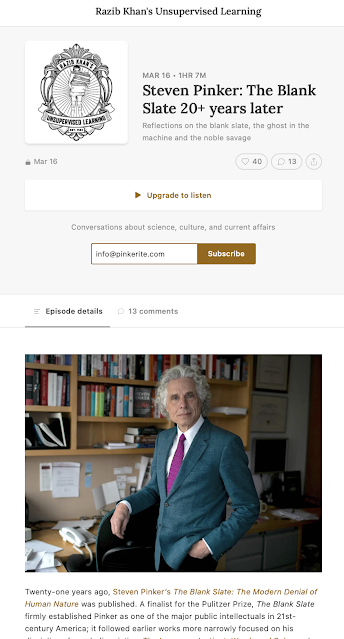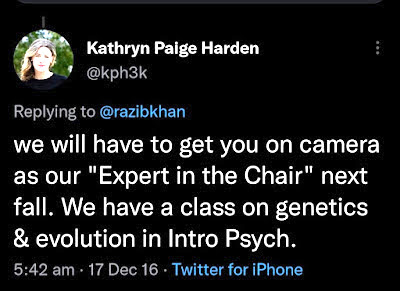
I thought Pinker might be in the process of ghosting Khan like he did to racist Steve Sailer after a decade of promoting Sailer's career, but apparently not. I recently saw that Khan's Substack - which I guess I should monitor more closely than I have been - has an interview with Pinker on March 16.
But the full interview is only available to Khan's subscribers and I'm not about to give money to Razib Khan - who do you think I am, Ron Unz?
So as usual, Pinker is preaching to the racist choir about his "Blank Slate" claims, with no need to worry he might receive any inconvenient questions or pushback about his views.
Based on the summary, it appears the interview is the usual combination of sociobiology and whining about the failure of American society at large to express admiration for Pinker and his Deep Thoughts (now shamelessly monetized) the way the lazy gullible media usually does.
Despite extraordinary advances in genome-wide association analysis and the application of cutting-edge computational biological techniques to understand how the brain and behavior work at the scale of DNA, much of American society remains wedded to the blank slate, and indeed widely applied policies have taken the implications of the assumption still further than a generation ago. Pinker points out that arguments for cultural variation driving group differences are now taboo, on top of the earlier wariness around exploring any genetic basis of these differences.
First of all, genome-wide association analysis (GWAS) has not proven sociobiology beliefs correct, as Pinker, Khan and people like their pal Kathryn Paige Harden like to claim.
But also this sentence reveals the sociobiological thinking of Pinker and Khan:
Pinker points out that arguments for cultural variation driving group differences are now taboo, on top of the earlier wariness around exploring any genetic basis of these differences.
"Group differences" is sociobiology-speak for different socio-economic levels of success by race. It's right next door to "human biodiversity."
According to this paper from 2021, How White nationalists mobilize genetics: From genetic ancestry and human biodiversity to counterscience and metapolitics - my bold.
The public face of human biodiversity includes, on one side, writers for the far right, White nationalist outlets like Steve Sailer of the Unz Review and Jared Taylor of American Renaissance, and, on the other, people who are not ostensibly political but willing to write provocatively about topics like race and eugenics like Razib Khan of Discover magazine and Steve Hsu, physicist and entrepreneur of the company Genomic Prediction (Eror, 2013; Feldman, 2016; MacDougald & Willick, 2017; Schulson, 2017) or centrist liberals like Steven Pinker (2006) who legitimates human biodiversity ideas like the evolution of Jewish intelligence. There is also a large set of less well-known and especially anonymous or pseudonymous bloggers and tweeters in the human biodiversity orbit. There is an effort to conceal or deny how organized human biodiversity is. The humanbiologicaldiversity.com website’s design is attributed to the generically named “James Wilson” though no contact information is offered. Blogger @hbdchick recently tweeted “human biodiversity isn’t a movement” it’s “simply the diversity found among and between human populations that has a biological basis.”10
We know that Pinker discounts racism and poverty as drivers of crime. So what does Pinker think drives crime, especially "group differences" in crime?
Well he doesn't come right out and say it, as usual, but it's easy enough to infer, and not just because he's been supporting race pseudoscience hawkers for at least twenty years - like Sailer, Khan, the Quillette gang, Linda Gottfredson, etc.
In Pinker's book "The Better Angels of Our Nature" he wrote:
...The idea that young men are civilized by women and marriage may seem as corny as Kansas in August, but it has become a commonplace of modern criminology. A famous study that tracked a thousand low-income Boston teenagers for forty-five years discovered that two factors predicted whether a delinquent would go on to avoid a life of crime: getting a stable job, and marrying a woman he cared about and supporting her and her children. The effect of marriage was substantial: three-quarters of the bachelors, but only a third of the husbands, went on to commit more crimes. This difference alone cannot tell us whether marriage keeps men away from crime or career criminals are less likely to get married, but the sociologists Robert Sampson, John Laub, and Christopher Wimer have shown that marriage really does seem to be a pacifying cause.
 |
| Pinker and his right-wing, plutocrat-funded, Republican & IDW pals on the board of Fair-for-all __________________________________ |
When Jon Stewart interviewed Andrew Sullivan, (Pinker's fellow member of the board of advisors of the anti-CRT grift organization Fair for all) Sullivan claimed that the struggle for Black people in the United States had everything to do with "Black culture."
Sullivan is notorious for promoting racist Charles Murray's sociobiological claims in The Bell Curve.
So why exactly have Black people had lower marriage rates? What makes "Black culture" the way it is, if you completely discount socio-economics and history?
Stewart didn't force Sullivan to give an answer to that - but Pinker gives an answer:
Pinker points out that arguments for cultural variation driving group differences are now taboo, on top of the earlier wariness around exploring any genetic basis of these differences.
It's obvious here that Pinker believes the "cultural variation driving group differences" is due to the "genetic basis of these differences."
So hawkers of sociobiology like Pinker, Sullivan and Khan believe the ultimate cause for why Black people in the United States don't get married as often as other "races" ...is because they are Black.
They believe there is some special genetic component of Blackness that makes Black people avoid marriage, and because they don't get married as often, therefore are more likely to commit crimes. And they think that GWAS studies will identify genes in Black people that cause this reluctance to get married. That is what sociobiology is all about.
Of course all "groups" in the United States are getting married less often now, but I've never seen contrary data cause sociobiologists to change their minds.
A curious coincidence, none of the three was born in the United States. Pinker was born in Canada, Sullivan was born in England and Khan was born in Bangladesh. But they seem to share the mission of coming to the United States to support racist claims (and take money from right-wing plutocrats to do it) about Black Americans, based on sociobiological beliefs.
The term sociobiology was popularized by E. O. Wilson, who, like Pinker, mostly avoided making blatant racist statements, while at the same time encouraging racist extremists.
Wilson encouraged the career of a racist, Jean-Phillipe Rushton - who was a big influence on - you guessed it - Razib Khan.
Because many people reacted negatively to E. O. Wilson's sociobiology claims, the term sociobiology is almost never used by those who promote sociobiology. The preferred terms are evolutionary psychology, something Pinker is closely associated with, and behavioral genetics, most recently connected to Kathryn Paige Harden but invented by extreme racist Francis Galton.
Never forget that the people promoting GWAS as evidence of genetic "group differences" have political agendas and they are not afraid to advocate for making those agendas public policy while claiming they don't have political agendas.
Like the time Kathryn Paige Harden, a friend and promoter of Razib Khan, compared people who refute sociobiology-based political solutions to bank robbers.
Sociologist and criminologist Callie Burt:
Harden argues that there are others who support genetics research on social outcomes, include a eugenics right, which has and will put this to use in the service of inferiorizing racial/ethnic and other disadvantaged groups. Harden positions herself as occupying the rational (ostensibly non-ideological) middle: In contrast to this ‘eugenics view’, Harden states that “[w]hat I am aiming to do in this book is to re-envision the relationship between genetic science and equality.” She asks, “[c]an we peel apart human behavioral genetics … from the racist, classist, and eugenicist ideologies it has been entwined with for decades? Can we imagine a new synthesis? And can this synthesis broaden our understanding of what equality looks like and how to achieve it?” (p18-9).
To this she answers not just ‘yes we can’, but ‘we must’. Indeed, in a surprisingly aggressive section of the book, which departs somewhat from her tone elsewhere, she argues that to do social research without considering genetic differences between individuals is the moral equivalent not of jaywalking but bank robbery(!!). Specifically, Harden writes about an asserted (but not demonstrated) “tacit collusion in social science to ignore genetic differences between people.” She states such ‘tacit collusion’ (which I dispute exists, more on that below), “is not wrong in the way that jaywalking is wrong…. It’s wrong in the way that robbing banks is wrong. It’s stealing.”
Yikes. For the non-criminology readers, robbery isn’t ‘stealing’. Robbery is the use of force or threat of the use of force to take something from others; in bank robbery, this would be money. Perhaps if she mentioned this offhand or in a talk, I may let it go, but in a book this was clearly a thoughtful, albeit absurd and unjustified in my view, moral comparison. How does she get here? And, are her arguments sound? [Foreshadowing: no idea and no.]
The journey is interesting, especially with the relatable personal examples, but the logic and evidence presented is partial and tendentious. Harden battles with straw men, overlooks nuance and contrary or complicating evidence, and deftly avoids several of the longstanding critiques of behavior genetics, which now apply to sociogenomics: these include the population specificity and, therefore, incomparability of heritability studies across groups (defined, for example, by social class), the social construction of the outcomes, and downward causation, as well as a host of methodological issues, including assumptions and limitations, in current GWAS and other sociogenomics studies.
I do think there is much to discuss on these issues (in fact, I’m writing a book about it myself), but charitable engagement with different views and thorough engagement with existing scientific evidence and theory is not found in this book, in my reading. She’s selling a view, in part by curiously denigrating her opponents while ignoring their critiques.
Unsuprisingly, the Peter Thiel-funded Big Think promotes behavioral genetics and Harden. Although the page for the interview is branded: IN PARTNERSHIP WITH John Templeton Foundation.
According to SourceWatch: The John Templeton Foundation tries to encourage the integration of religious beliefs and free-market principles into the classroom.
